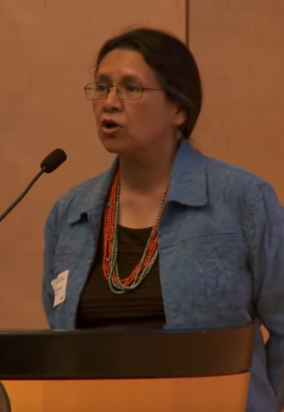Debbie Reese
Debbie Reese | |
|---|---|
 Reese at 2016 Association of Children's Librarians Institute | |
| Born | |
| Nationality | Nambé Pueblo Nation |
| Occupation(s) | Scholar, educator |
| Known for | American Indians in Children's Literature |
| Notable work | An Indigenous Peoples' History of the United States for Young People (2019) |
Debbie Reese is a Nambé Pueblo scholar and educator. Reese founded American Indians in Children's Literature, which analyzes representations of Native and Indigenous peoples in children's literature. She co-edited a young adult adaptation of An Indigenous Peoples' History of the United States with Jean Mendoza in 2019.[1][2]
Early life and education
[edit]Reese was raised on a reservation in New Mexico and is a tribally enrolled member of the Nambé Pueblo nation.[3]
She received a PhD in education from University of Illinois at Urbana-Champaign.[4] She later received her MLIS from San Jose State University through a grant that funded 20 Native students to complete the degree.[3]
Career
[edit]Prior to obtaining her PhD, she was a school teacher and taught at two American elementary schools, and at two schools for Native Americans: Riverside Indian School in Anadarko, Oklahoma, and Santa Fe Indian School in Santa Fe, New Mexico.[5] She previously taught at University of Illinois at Chicago.[5]
In 2006, Reese founded American Indians in Children's Literature (AICL), an organization and website that offers critical analysis of Native and Indigenous peoples in children's literature.[4][6][7] She frequently discusses the inaccuracy of depictions of Natives in classic American children's literature like Peter Pan and Little House on the Prairie series, and suggests that they lead readers to believe that Natives are no longer present.[4][6]
Reese advocates for teachers and parents to select books written for and by Native Americans as the best way to engage their narratives.[6] She has repeatedly spoken against the publication of Native stories by white writers from the "big five" publishers.[4] Reese was one of several writers who spoke out against the publication of children's book A Birthday Cake for George Washington and used AICL to track the publisher's response to the campaign.[8]
In 2019, she and Jean Mendoza co-wrote An Indigenous Peoples' History of the United States for Young People, based on An Indigenous Peoples' History of the United States.[3] The book was named a 2020 American Indian Youth Literature Young Adult Honor Book.[9]
Personal life
[edit]Reese lives in New Mexico. She is married and has one daughter.[3]
Works
[edit]- Mendoza, Jean; Reese, Debbie (2019). An Indigenous Peoples' History of the United States for Young People. Penguin Random House. ISBN 9780807049396.
Accolades
[edit]- For An Indigenous Peoples' History of the United States for Young People:
- Best YA Nonfiction of 2019, Kirkus Reviews[11]
- Best Nonfiction of 2019, School Library Journal[12]
- 2020 American Indian Youth Literature Award for Young Adult Honor Book[9]
- 2020 In the Margins Award[13]
References
[edit]- ^ Chow, Kat. "Little House On The Controversy: Laura Ingalls Wilder's Name Removed From Book Award". NPR.org. Retrieved 2020-08-04.
- ^ Zotigh, Dennis W.; Gokey, Renee. "Indigenous Peoples' Day: Rethinking How We Celebrate American History". www.smithsonianmag.com. Retrieved 2020-08-04.
- ^ a b c d Reese, D.; Angton, A. (2020). "An Interview with Debbie Reese". Journal of Critical Thought and Praxis. 9. doi:10.31274/jctp.11237.
- ^ a b c d ""We Are Still Here": An Interview with Debbie Reese" (PDF). English Journal. 106 (1): 51–52. 2016. doi:10.58680/ej201628735.
- ^ a b Strauss, Valerie (2019-11-27). "How NOT to teach Thanksgiving". The Washington Post.
- ^ a b c Lewis, Kate (2018-10-29). "Many classic children's books have troubling themes or language. Should we read them anyway?". The Washington Post.
- ^ Alexandra Alter (2020-08-14). "'We've Already Survived an Apocalypse': Indigenous Writers Are Changing Sci-Fi". The New York Times. p. C1. Retrieved 2020-08-19.
- ^ Menkart, Deborah (2016-01-18). "Under Pressure, Scholastic Recalls Racist Children's Book". The Huffington Post. Retrieved 4 August 2020.
- ^ a b "AILA announces 2020 American Indian Youth Literature Awards". News and Press Center. 2020-01-27. Retrieved 2020-08-04.
- ^ "Debbie Reese | Awards & Grants". www.ala.org. Retrieved 2020-08-04.
- ^ "Best YA Nonfiction of 2019". Kirkus Reviews. Retrieved 2020-08-04.
- ^ Willoughby, Miriam DesHarnais, Heidi Grange, Kacy Helwick, Elizabeth Lovsin, Vanessa. "Best Nonfiction 2019 | SLJ Best Books". School Library Journal. Retrieved 2020-08-04.
{{cite web}}: CS1 maint: multiple names: authors list (link) - ^ Parrott, Kiera (2020-02-12). ""In the Margins" Committee Announces 2020 Book Awards Honoring Marginalized & BIPOC Youth". School Library Journal. Retrieved 2022-01-31.
External links
[edit]- Living people
- Native American academics
- Native American women writers
- 21st-century Native American women
- 21st-century Native American writers
- Indigenous peoples in the United States
- University of Illinois College of Education alumni
- San Jose State University alumni
- 20th-century Native American women
- 20th-century Native Americans
- Native American librarians
- Librarians from New Mexico
- American women librarians
- American librarians